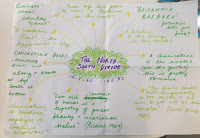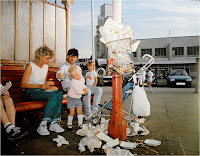Bolton and Blackpool "Worktown Project": Humphrey Spender (1937)
http://boltonworktown.co.uk/

"The Last Resort": Martin Parr (1983-86)
http://www.magnumphotos.com/C.aspx?VP3=SearchResult&ALID=2S5RYDYDHEB9

The North South Divide - Helen M Jewell (1995)
"The north south divide affects property and movement - northerners being unable to afford to move to London or the South East, southerners being afraid to move north in case they cannot afford to return".
"In the north versus the south, there were unfavourable contrasts in notifiable crime, education, drinking habits and housing stock".
"Manchester in the 19th century appeared to eclipse London, but the capitals pull had re-asserted itself by the end of the century."
An old northern saying: "Where there's muck, there's brass"; the relationship between industry and wealth, from the industrial revolution.
"Manchester is often the butt of southern jokes. Beau Brummell (1778-1940) learned his army regiment was being sent from Brighton to Manchester and famously said "I had not reckoned on foreign service when I joined up."
Margaret Thatcher: "The north south divide is a myth; there are areas of difficulty in all parts of the country".
The Sunday Times, 1987: "The main division is social rather than geographical."
Kenneth Clarke: "The divide is a ridiculous simplification; it reinforces the cloth cap and brass band image the south has of the north, which does the area no service at all."
David Sainsbury: "There is no fundamental difference, there are simply more depressed areas in the north."
The Yorkshire Post, July 1987: "The north south divide grows ever wider." (Front page headline after the release of the Central Statistical Office figures in Regional Trends).
Central Statistical Office figures in Regional Trends, 1987: "The north is suffering the highest unemployment and lowest wages on mainland Britain and mortality rates are second highest to Scotland."
Lord King, Chairman of British Airways, 1988: " The north south divide exists most dangerously in our minds and we have to get rid of that complex."
MORI poll of 201 executives in London, Leeds and Manchester, 1989: "The typical southern employee was found to be ambitious, entrepreneurial, under stress and wealthy. The typical northern employee was found to be friendly, careful with money, down to earth, loyal and with a good sense of humour." Margaret Thatcher responded by announcing the divide had gone.
Emma Duncan, The Economist, 1990: "The south is clinging to an outdated caricature of the north; this idea stems from a prejudice as old as the industrial revolution."
The North (And Almost Everything In It) - Paul Morley (2013)
"A north packed with intrepid people handing on the north, as they see it, all that history and nature and difference."
"... A form of unique exotica that suggested the north was out of this world."
"... Became a cliche of it's own sentimental self pity, making a way for non-northerners to keep it in it's place, condescend to it, even dismiss it."
" David Hockney won a scholarship in 1948 to the Bradford Grammar School (one of the best schools in the country at the time.) He saw Puccini's "La Boheme" at the Alhambra Theatre in Bradford's Morley Street; it was the first opera the future artist had ever seen."
David Hockney: "East Yorkshire, to the uninitiated, looks like a lot of little hills. But it does have these marvellous valleys that were caused by glaciers, not rivers. So it is unusual."
Morrissey: "You're southern - you wouldn't understand. When you're northern, you're northern forever and you're instilled with a certain feel for life that you can't get rid of".
Wilfred Pickles, 1949: "Our rich contrast of voices is a tapestry of great beauty and incalculable value."
John Robert Clynes: "Not to practise the class war but to end it; the abuse of power in the workplace, the inequalities of health and education, the waste of worklessness and the cruelty of crime."
Northern Powerhouse:
BBC News, 16th November 2015
(http://www.bbc.co.uk/news/uk-england-manchester-34787669)
"Aiming to bridge the economic gap between the north and south by attracting investment and improving transport links between it's towns and cities".
"It is an attempt to turn the North's combined population of 15m into an economic force to rival that of London and the South East."
- 50% are confident the government will boost the North's economy, while 40% disagree.
- 65% of 18-24-year-olds are confident it will boost the economy
- 47% of over-55s agree with this statement
- 28% think it is fair London receives more for the arts, science and transport
BBC News, 14th May 2015
(http://www.bbc.co.uk/news/magazine-32720462)
"...by focusing the Northern Powerhouse on the north's biggest urban area (Manchester), the government is simply propagating a smaller-scale version of the current imbalance between the north and London."
"I'm not sure what 'the North' is," admits Hilton Dawson, leader of the North East Party, which campaigned for a regional parliament in this year's general election. "The only time I've heard people in the South talk about the North is to tell us how grim it is up here."
The Guardian, 18th March 2015
(http://www.theguardian.com/uk-news/the-northerner/2015/mar/18/northern-powerhouse-is-north-really-winner-2015-budget)
"The Tories have taken most money away from the communities that can least afford it, cutting spending power for every household in the 10 most deprived areas in England by 16 times as much as the 10 least deprived. Seven out of the top 10 most deprived communities in England are in the north."
"Cumbria and the great city of Carlisle, ignored once again by the chancellor and left out of the budget altogether, along with Northumberland. The door of the northern powerhouse is not open to all, it seems."
Northern Soul
The Twisted Wheel - Manchester
The Wigan Casino - Wigan
The Goldmine - Canvey Island (Essex)
The Royalty - Southgate
Largely a working class subculture, it got a lot less coverage than that of the middle class (i.e. the new romantics). "Soul Boys" - there were differences between northern and southern soul subcultures. Northern was more focused on old soul and sourcing rare old records, swapping and comparing them. Southern was more focused on the new soul being made. The clothes worn were clothes that you could easily dance in; oversized and comfortable. Started in a club in Wigan, and spread down the country to Essex; these where the northern and southern soul capitals of England at the time, with the biggest infamous dances.
Madchester (http://www.theguardian.com/music/2012/apr/21/madchester-manchester-interviews-hook-ryder)
Andy Barker (keyboardist 808 State): "There was an amazing creative energy in Manchester at the time; people just invented their own jobs – DJs, graphic designers, clothes labels. Everyone decided to have a go, and for once there was no one telling you that you couldn't."
Gary Aspden: "The 10 years prior to acid house in Manchester had seen various fashions that had been huge among working-class northern youth but had never been picked up on by the mainstream media. And much of that style was reflected in what people were wearing in Manchester in 88/89."
Terry Christian: "The Madchester badge made it too easy to be dismissed as a phase by the media with that patronising attitude they adopt when dealing with scallies from "oop north".
Tina Street: "Everyone wanted to be a part of Manchester. Looking back, we took it all for granted and thought it would be like that for ever. There was a lot of hugging and barriers broken down, it really was the summer of love."
The opening of the Hacienda nightclub and the beginning of Factory Records was significant in the development of Manchester in popular culture. The Festival of the Tenth Summer in July 1986, organised by Factory Records, helped to consolidate Manchester's standing as a centre for alternative pop-culture. According to Dave Haslam, the festival demonstrated that "the city had become synonymous with ... larger-than-life characters playing cutting edge music ... Individuals were inspired and the city was energised; of it's own accord, uncontrolled". The mushrooming of Manchester's nightlife during the Madchester period has had a long-term impact, particularly with the subsequent development of the Gay Village and Northern Quarter. The attraction of the city was such that, at the height of Madchester in 1990, the University of Manchester was the most sought-after destination for university applicants in the UK. The scene also gave a boost to the city's media and creative industries.
Other Relevant Stuff...
Government favours London over the north and other areas...
(http://www.theguardian.com/uk-news/2015/dec/28/yorkshire-flooding-north-south-divide-york-leeds-london-south-east)
"The government has been accused of neglecting its duty to protect northern England from flooding, with one Yorkshire newspaper claiming it would be “unthinkable” that the floods that have affected Leeds, York and Manchester in recent days could ever be seen in London. The Yorkshire Evening Post: "It remains the case that such events, like those witnessed in this city, are unthinkable in London and much of the south-east, where state-of-the-art flood defences have long been in place.
It's a Myth (good for statistics)... (http://www.theguardian.com/commentisfree/2014/may/04/north-south-divide-myth-distraction)
"London, the great metropolitan capital of the sixth richest country on Earth, where one in four children live in overcrowded homes, over twice the English average. Of the 20 English local authorities with the highest levels of child poverty, seven are located in London."
George Orwell, 1937: "Go to the industrial north, and you are conscious of entering a strange country".
Geographical Stuff... (http://www.ons.gov.uk/ons/rel/regional-trends/region-and-country-profiles/key-statistics-and-profiles---august-2012/key-statistics---south-east--august-2012.html)
"In 2010, the population of the south east of England was 8.5 million people."

















































